Cultural Practice: Personal Reflection and Interviews
VerifiedAdded on 2020/04/21
|6
|1147
|166
Report
AI Summary
This report, titled "Cultural Practice," presents a comprehensive analysis of cultural practices through personal reflections and cross-cultural interviews. The author explores observable and non-observable aspects of culture, providing examples from Arabian culture and discussing the impact of metaphors in cross-cultural communication. The report delves into personal, cultural, and social identities, emphasizing the importance of individual identity. It also examines the concepts of cultural critics and learners, and the three colors of worldview. Furthermore, the report includes reflections on interviews with individuals from Spanish and Iraqi backgrounds, comparing and contrasting their perspectives on culture, family, education, and language with the author's own Emirati background. The analysis highlights the varying degrees of attachment to cultural characteristics and traditions.
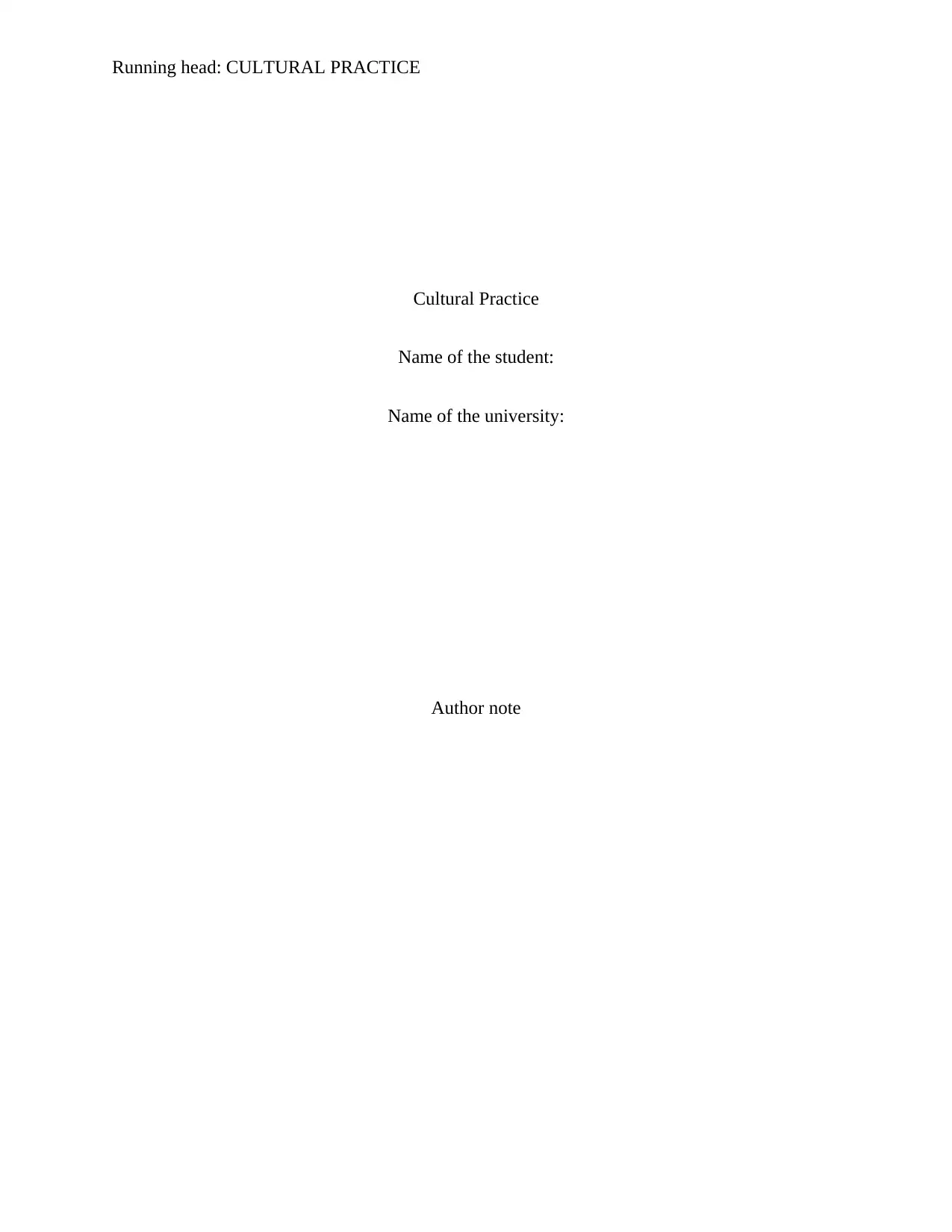
Running head: CULTURAL PRACTICE
Cultural Practice
Name of the student:
Name of the university:
Author note
Cultural Practice
Name of the student:
Name of the university:
Author note
Paraphrase This Document
Need a fresh take? Get an instant paraphrase of this document with our AI Paraphraser
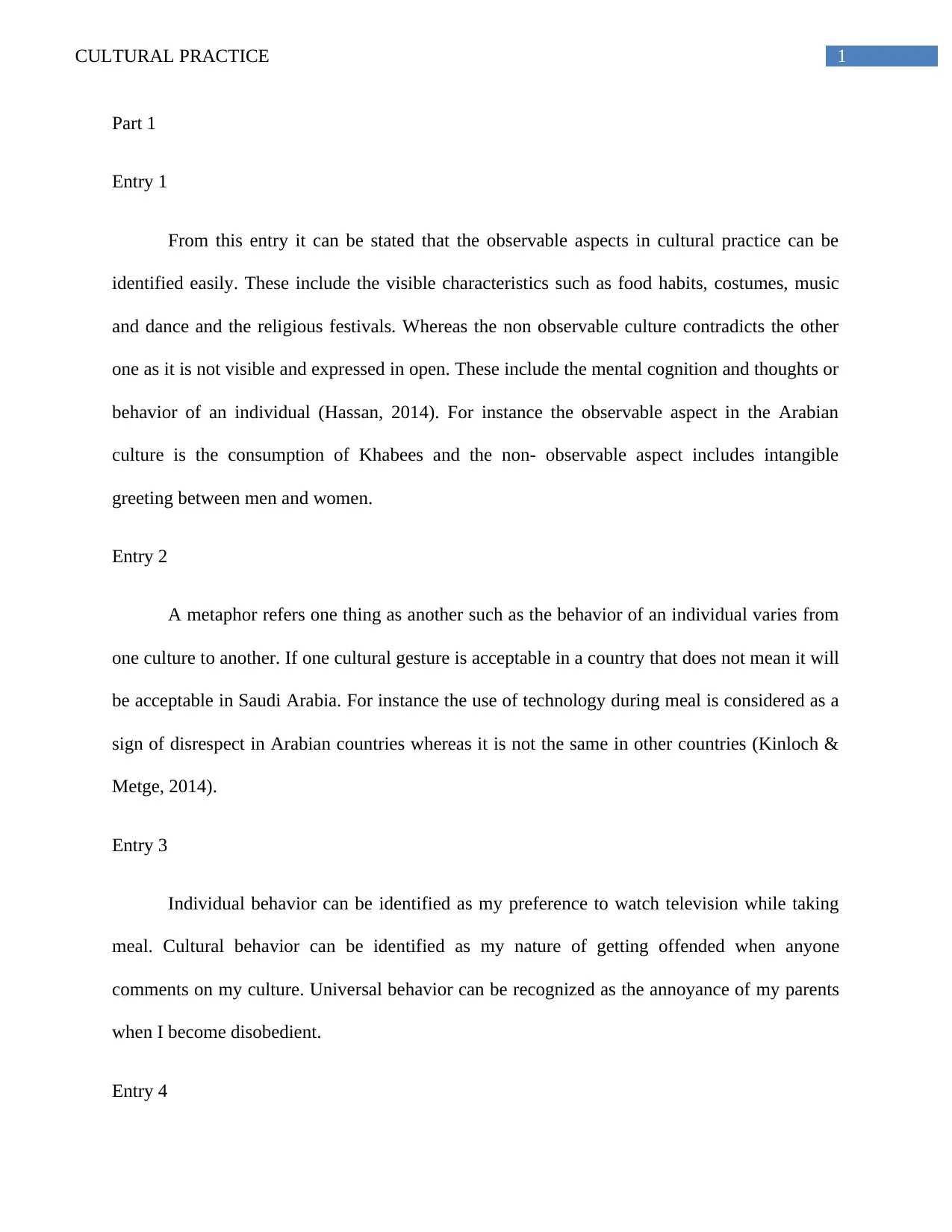
1CULTURAL PRACTICE
Part 1
Entry 1
From this entry it can be stated that the observable aspects in cultural practice can be
identified easily. These include the visible characteristics such as food habits, costumes, music
and dance and the religious festivals. Whereas the non observable culture contradicts the other
one as it is not visible and expressed in open. These include the mental cognition and thoughts or
behavior of an individual (Hassan, 2014). For instance the observable aspect in the Arabian
culture is the consumption of Khabees and the non- observable aspect includes intangible
greeting between men and women.
Entry 2
A metaphor refers one thing as another such as the behavior of an individual varies from
one culture to another. If one cultural gesture is acceptable in a country that does not mean it will
be acceptable in Saudi Arabia. For instance the use of technology during meal is considered as a
sign of disrespect in Arabian countries whereas it is not the same in other countries (Kinloch &
Metge, 2014).
Entry 3
Individual behavior can be identified as my preference to watch television while taking
meal. Cultural behavior can be identified as my nature of getting offended when anyone
comments on my culture. Universal behavior can be recognized as the annoyance of my parents
when I become disobedient.
Entry 4
Part 1
Entry 1
From this entry it can be stated that the observable aspects in cultural practice can be
identified easily. These include the visible characteristics such as food habits, costumes, music
and dance and the religious festivals. Whereas the non observable culture contradicts the other
one as it is not visible and expressed in open. These include the mental cognition and thoughts or
behavior of an individual (Hassan, 2014). For instance the observable aspect in the Arabian
culture is the consumption of Khabees and the non- observable aspect includes intangible
greeting between men and women.
Entry 2
A metaphor refers one thing as another such as the behavior of an individual varies from
one culture to another. If one cultural gesture is acceptable in a country that does not mean it will
be acceptable in Saudi Arabia. For instance the use of technology during meal is considered as a
sign of disrespect in Arabian countries whereas it is not the same in other countries (Kinloch &
Metge, 2014).
Entry 3
Individual behavior can be identified as my preference to watch television while taking
meal. Cultural behavior can be identified as my nature of getting offended when anyone
comments on my culture. Universal behavior can be recognized as the annoyance of my parents
when I become disobedient.
Entry 4
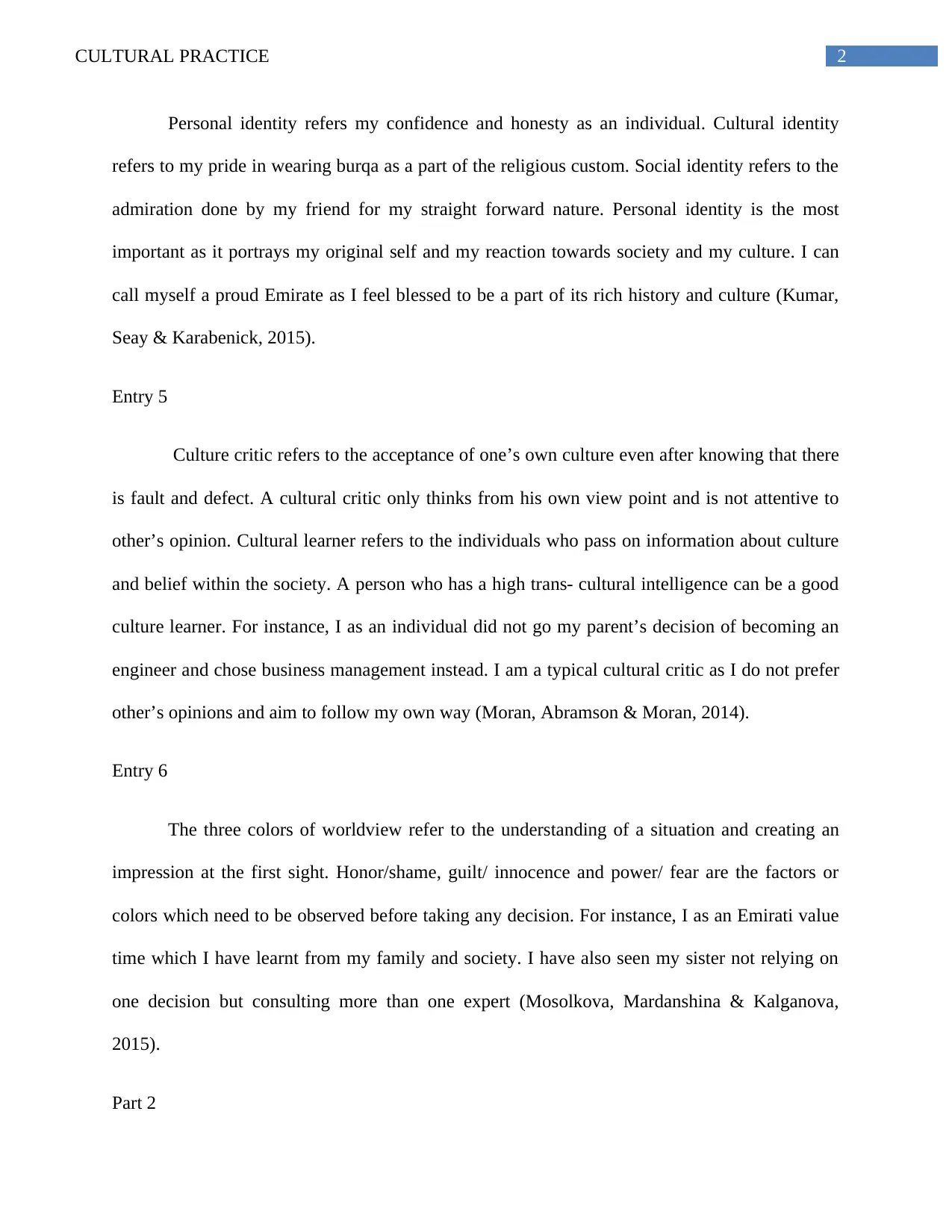
2CULTURAL PRACTICE
Personal identity refers my confidence and honesty as an individual. Cultural identity
refers to my pride in wearing burqa as a part of the religious custom. Social identity refers to the
admiration done by my friend for my straight forward nature. Personal identity is the most
important as it portrays my original self and my reaction towards society and my culture. I can
call myself a proud Emirate as I feel blessed to be a part of its rich history and culture (Kumar,
Seay & Karabenick, 2015).
Entry 5
Culture critic refers to the acceptance of one’s own culture even after knowing that there
is fault and defect. A cultural critic only thinks from his own view point and is not attentive to
other’s opinion. Cultural learner refers to the individuals who pass on information about culture
and belief within the society. A person who has a high trans- cultural intelligence can be a good
culture learner. For instance, I as an individual did not go my parent’s decision of becoming an
engineer and chose business management instead. I am a typical cultural critic as I do not prefer
other’s opinions and aim to follow my own way (Moran, Abramson & Moran, 2014).
Entry 6
The three colors of worldview refer to the understanding of a situation and creating an
impression at the first sight. Honor/shame, guilt/ innocence and power/ fear are the factors or
colors which need to be observed before taking any decision. For instance, I as an Emirati value
time which I have learnt from my family and society. I have also seen my sister not relying on
one decision but consulting more than one expert (Mosolkova, Mardanshina & Kalganova,
2015).
Part 2
Personal identity refers my confidence and honesty as an individual. Cultural identity
refers to my pride in wearing burqa as a part of the religious custom. Social identity refers to the
admiration done by my friend for my straight forward nature. Personal identity is the most
important as it portrays my original self and my reaction towards society and my culture. I can
call myself a proud Emirate as I feel blessed to be a part of its rich history and culture (Kumar,
Seay & Karabenick, 2015).
Entry 5
Culture critic refers to the acceptance of one’s own culture even after knowing that there
is fault and defect. A cultural critic only thinks from his own view point and is not attentive to
other’s opinion. Cultural learner refers to the individuals who pass on information about culture
and belief within the society. A person who has a high trans- cultural intelligence can be a good
culture learner. For instance, I as an individual did not go my parent’s decision of becoming an
engineer and chose business management instead. I am a typical cultural critic as I do not prefer
other’s opinions and aim to follow my own way (Moran, Abramson & Moran, 2014).
Entry 6
The three colors of worldview refer to the understanding of a situation and creating an
impression at the first sight. Honor/shame, guilt/ innocence and power/ fear are the factors or
colors which need to be observed before taking any decision. For instance, I as an Emirati value
time which I have learnt from my family and society. I have also seen my sister not relying on
one decision but consulting more than one expert (Mosolkova, Mardanshina & Kalganova,
2015).
Part 2
⊘ This is a preview!⊘
Do you want full access?
Subscribe today to unlock all pages.

Trusted by 1+ million students worldwide
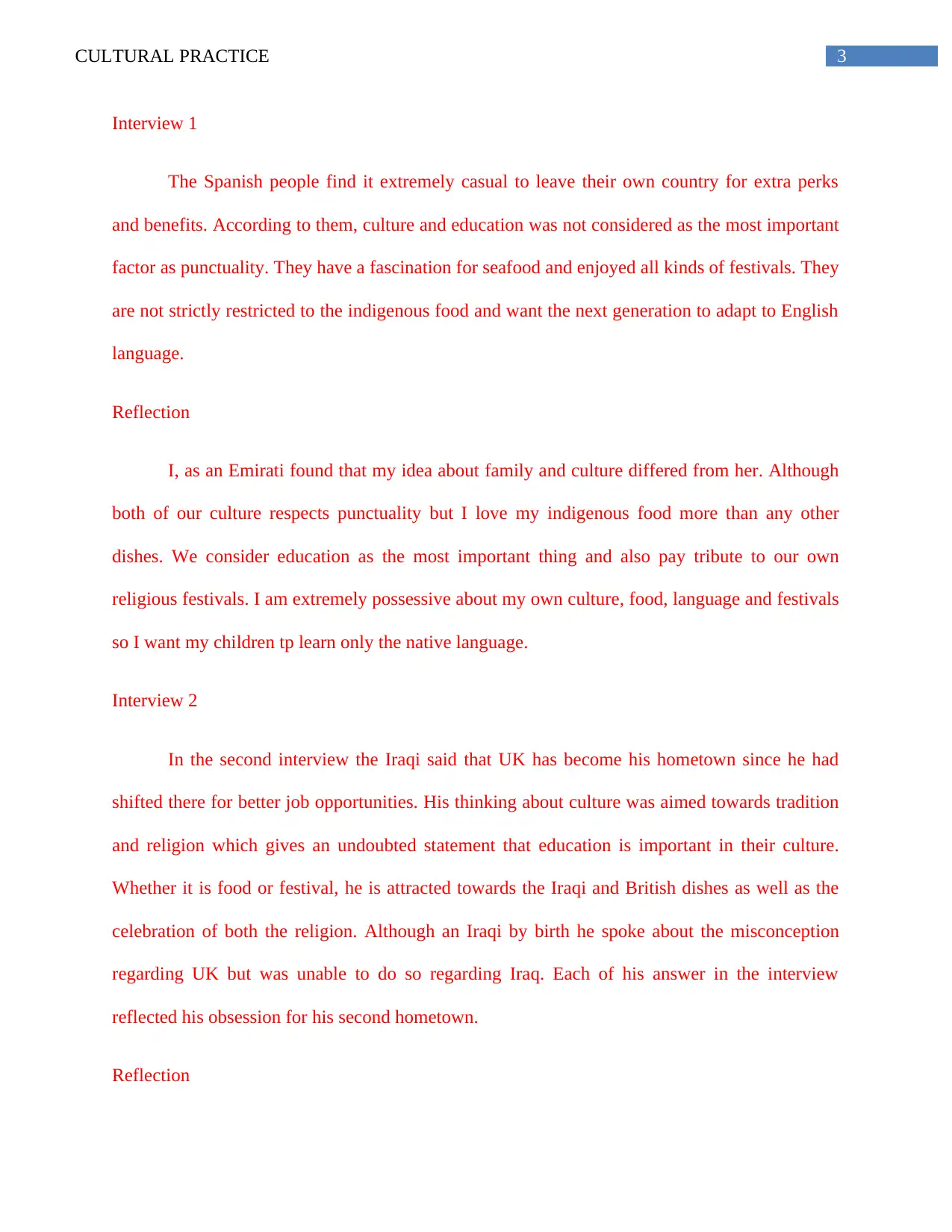
3CULTURAL PRACTICE
Interview 1
The Spanish people find it extremely casual to leave their own country for extra perks
and benefits. According to them, culture and education was not considered as the most important
factor as punctuality. They have a fascination for seafood and enjoyed all kinds of festivals. They
are not strictly restricted to the indigenous food and want the next generation to adapt to English
language.
Reflection
I, as an Emirati found that my idea about family and culture differed from her. Although
both of our culture respects punctuality but I love my indigenous food more than any other
dishes. We consider education as the most important thing and also pay tribute to our own
religious festivals. I am extremely possessive about my own culture, food, language and festivals
so I want my children tp learn only the native language.
Interview 2
In the second interview the Iraqi said that UK has become his hometown since he had
shifted there for better job opportunities. His thinking about culture was aimed towards tradition
and religion which gives an undoubted statement that education is important in their culture.
Whether it is food or festival, he is attracted towards the Iraqi and British dishes as well as the
celebration of both the religion. Although an Iraqi by birth he spoke about the misconception
regarding UK but was unable to do so regarding Iraq. Each of his answer in the interview
reflected his obsession for his second hometown.
Reflection
Interview 1
The Spanish people find it extremely casual to leave their own country for extra perks
and benefits. According to them, culture and education was not considered as the most important
factor as punctuality. They have a fascination for seafood and enjoyed all kinds of festivals. They
are not strictly restricted to the indigenous food and want the next generation to adapt to English
language.
Reflection
I, as an Emirati found that my idea about family and culture differed from her. Although
both of our culture respects punctuality but I love my indigenous food more than any other
dishes. We consider education as the most important thing and also pay tribute to our own
religious festivals. I am extremely possessive about my own culture, food, language and festivals
so I want my children tp learn only the native language.
Interview 2
In the second interview the Iraqi said that UK has become his hometown since he had
shifted there for better job opportunities. His thinking about culture was aimed towards tradition
and religion which gives an undoubted statement that education is important in their culture.
Whether it is food or festival, he is attracted towards the Iraqi and British dishes as well as the
celebration of both the religion. Although an Iraqi by birth he spoke about the misconception
regarding UK but was unable to do so regarding Iraq. Each of his answer in the interview
reflected his obsession for his second hometown.
Reflection
Paraphrase This Document
Need a fresh take? Get an instant paraphrase of this document with our AI Paraphraser
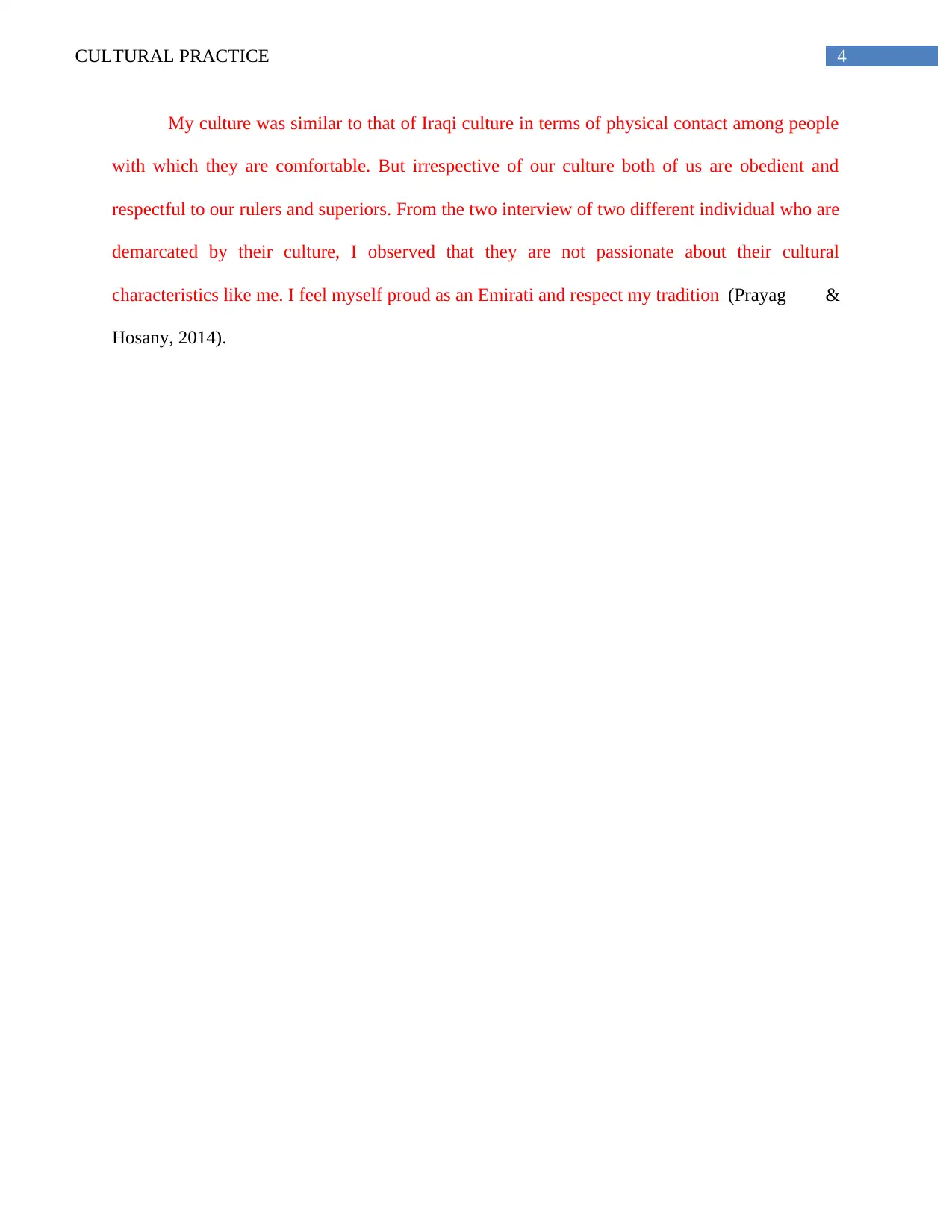
4CULTURAL PRACTICE
My culture was similar to that of Iraqi culture in terms of physical contact among people
with which they are comfortable. But irrespective of our culture both of us are obedient and
respectful to our rulers and superiors. From the two interview of two different individual who are
demarcated by their culture, I observed that they are not passionate about their cultural
characteristics like me. I feel myself proud as an Emirati and respect my tradition (Prayag &
Hosany, 2014).
My culture was similar to that of Iraqi culture in terms of physical contact among people
with which they are comfortable. But irrespective of our culture both of us are obedient and
respectful to our rulers and superiors. From the two interview of two different individual who are
demarcated by their culture, I observed that they are not passionate about their cultural
characteristics like me. I feel myself proud as an Emirati and respect my tradition (Prayag &
Hosany, 2014).
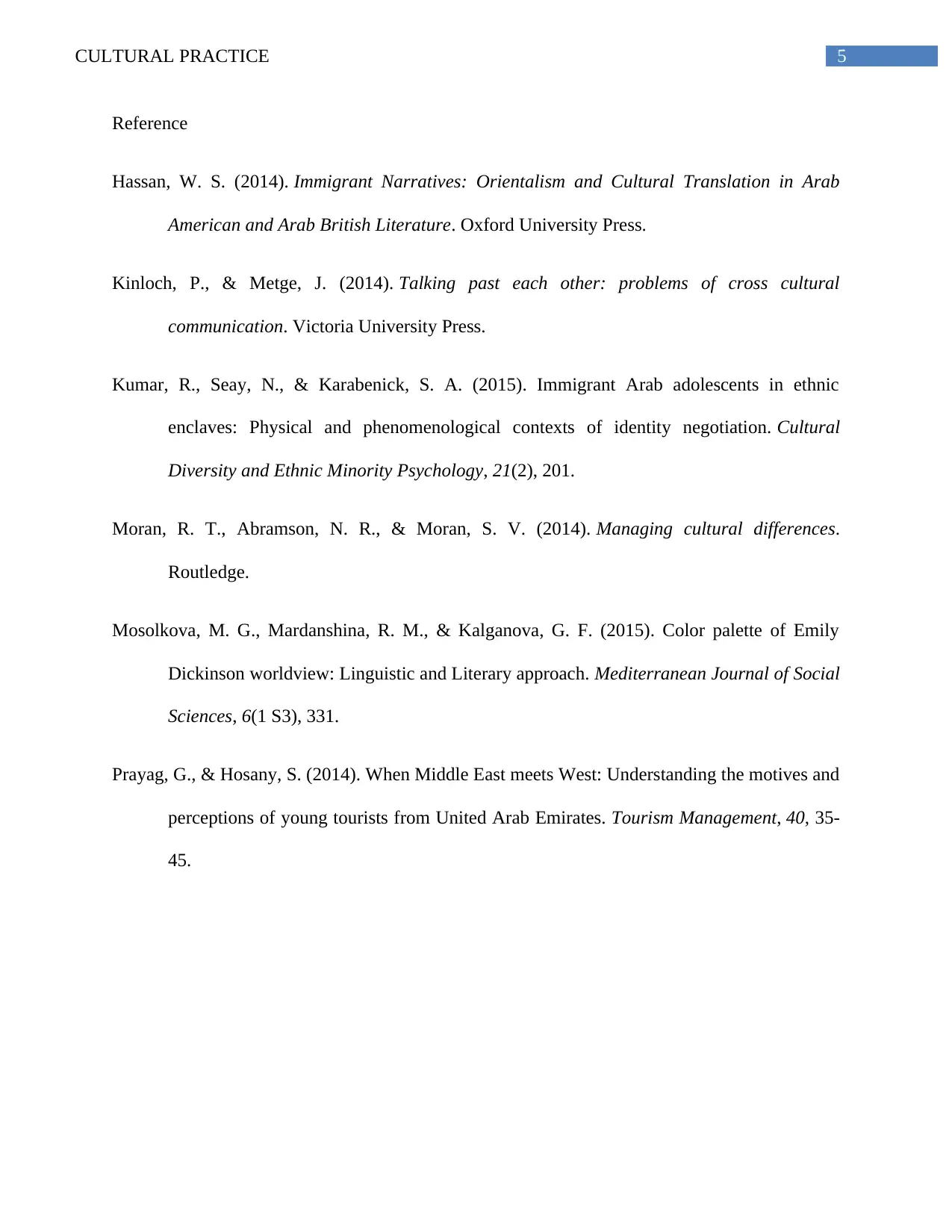
5CULTURAL PRACTICE
Reference
Hassan, W. S. (2014). Immigrant Narratives: Orientalism and Cultural Translation in Arab
American and Arab British Literature. Oxford University Press.
Kinloch, P., & Metge, J. (2014). Talking past each other: problems of cross cultural
communication. Victoria University Press.
Kumar, R., Seay, N., & Karabenick, S. A. (2015). Immigrant Arab adolescents in ethnic
enclaves: Physical and phenomenological contexts of identity negotiation. Cultural
Diversity and Ethnic Minority Psychology, 21(2), 201.
Moran, R. T., Abramson, N. R., & Moran, S. V. (2014). Managing cultural differences.
Routledge.
Mosolkova, M. G., Mardanshina, R. M., & Kalganova, G. F. (2015). Color palette of Emily
Dickinson worldview: Linguistic and Literary approach. Mediterranean Journal of Social
Sciences, 6(1 S3), 331.
Prayag, G., & Hosany, S. (2014). When Middle East meets West: Understanding the motives and
perceptions of young tourists from United Arab Emirates. Tourism Management, 40, 35-
45.
Reference
Hassan, W. S. (2014). Immigrant Narratives: Orientalism and Cultural Translation in Arab
American and Arab British Literature. Oxford University Press.
Kinloch, P., & Metge, J. (2014). Talking past each other: problems of cross cultural
communication. Victoria University Press.
Kumar, R., Seay, N., & Karabenick, S. A. (2015). Immigrant Arab adolescents in ethnic
enclaves: Physical and phenomenological contexts of identity negotiation. Cultural
Diversity and Ethnic Minority Psychology, 21(2), 201.
Moran, R. T., Abramson, N. R., & Moran, S. V. (2014). Managing cultural differences.
Routledge.
Mosolkova, M. G., Mardanshina, R. M., & Kalganova, G. F. (2015). Color palette of Emily
Dickinson worldview: Linguistic and Literary approach. Mediterranean Journal of Social
Sciences, 6(1 S3), 331.
Prayag, G., & Hosany, S. (2014). When Middle East meets West: Understanding the motives and
perceptions of young tourists from United Arab Emirates. Tourism Management, 40, 35-
45.
⊘ This is a preview!⊘
Do you want full access?
Subscribe today to unlock all pages.

Trusted by 1+ million students worldwide
1 out of 6
Related Documents
Your All-in-One AI-Powered Toolkit for Academic Success.
+13062052269
info@desklib.com
Available 24*7 on WhatsApp / Email
![[object Object]](/_next/static/media/star-bottom.7253800d.svg)
Unlock your academic potential
Copyright © 2020–2026 A2Z Services. All Rights Reserved. Developed and managed by ZUCOL.




